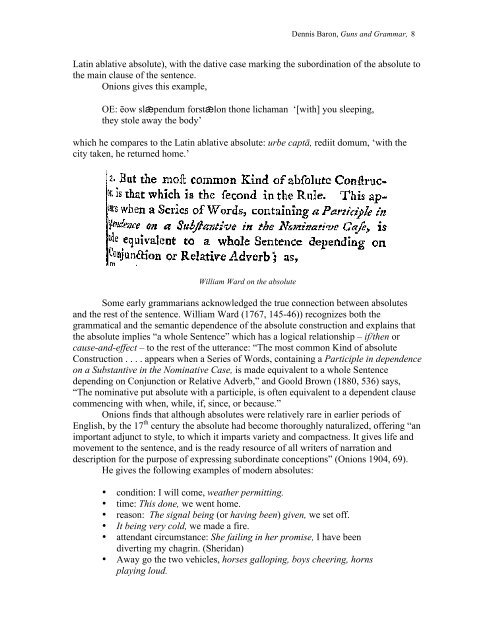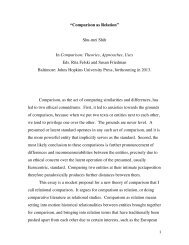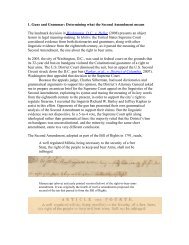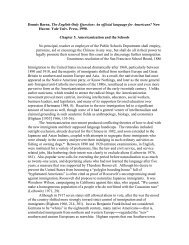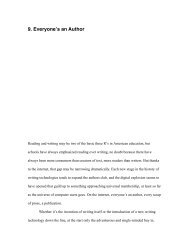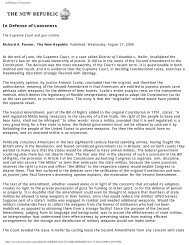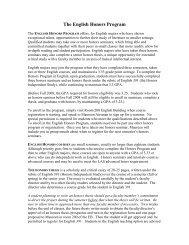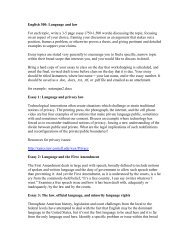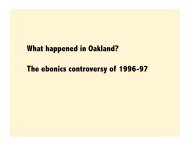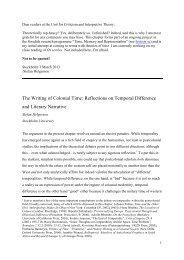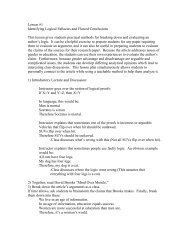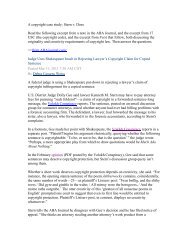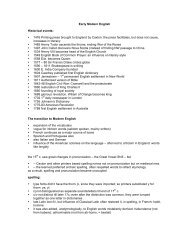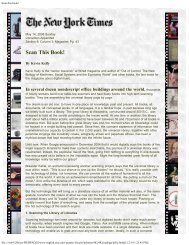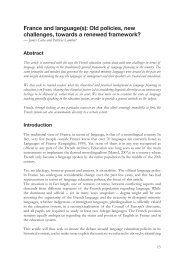Guns and Grammar: the Linguistics of the Second ... - English
Guns and Grammar: the Linguistics of the Second ... - English
Guns and Grammar: the Linguistics of the Second ... - English
You also want an ePaper? Increase the reach of your titles
YUMPU automatically turns print PDFs into web optimized ePapers that Google loves.
Dennis Baron, <strong>Guns</strong> <strong>and</strong> <strong>Grammar</strong>, 8<br />
Latin ablative absolute), with <strong>the</strong> dative case marking <strong>the</strong> subordination <strong>of</strong> <strong>the</strong> absolute to<br />
<strong>the</strong> main clause <strong>of</strong> <strong>the</strong> sentence.<br />
Onions gives this example,<br />
OE: ēow slǣpendum forstǣlon thone lichaman ‘[with] you sleeping,<br />
<strong>the</strong>y stole away <strong>the</strong> body’<br />
which he compares to <strong>the</strong> Latin ablative absolute: urbe captā, rediit domum, ‘with <strong>the</strong><br />
city taken, he returned home.’<br />
William Ward on <strong>the</strong> absolute<br />
Some early grammarians acknowledged <strong>the</strong> true connection between absolutes<br />
<strong>and</strong> <strong>the</strong> rest <strong>of</strong> <strong>the</strong> sentence. William Ward (1767, 145-46)) recognizes both <strong>the</strong><br />
grammatical <strong>and</strong> <strong>the</strong> semantic dependence <strong>of</strong> <strong>the</strong> absolute construction <strong>and</strong> explains that<br />
<strong>the</strong> absolute implies “a whole Sentence” which has a logical relationship – if/<strong>the</strong>n or<br />
cause-<strong>and</strong>-effect – to <strong>the</strong> rest <strong>of</strong> <strong>the</strong> utterance: “The most common Kind <strong>of</strong> absolute<br />
Construction . . . . appears when a Series <strong>of</strong> Words, containing a Participle in dependence<br />
on a Substantive in <strong>the</strong> Nominative Case, is made equivalent to a whole Sentence<br />
depending on Conjunction or Relative Adverb,” <strong>and</strong> Goold Brown (1880, 536) says,<br />
“The nominative put absolute with a participle, is <strong>of</strong>ten equivalent to a dependent clause<br />
commencing with when, while, if, since, or because.”<br />
Onions finds that although absolutes were relatively rare in earlier periods <strong>of</strong><br />
<strong>English</strong>, by <strong>the</strong> 17 th century <strong>the</strong> absolute had become thoroughly naturalized, <strong>of</strong>fering “an<br />
important adjunct to style, to which it imparts variety <strong>and</strong> compactness. It gives life <strong>and</strong><br />
movement to <strong>the</strong> sentence, <strong>and</strong> is <strong>the</strong> ready resource <strong>of</strong> all writers <strong>of</strong> narration <strong>and</strong><br />
description for <strong>the</strong> purpose <strong>of</strong> expressing subordinate conceptions” (Onions 1904, 69).<br />
He gives <strong>the</strong> following examples <strong>of</strong> modern absolutes:<br />
• condition: I will come, wea<strong>the</strong>r permitting.<br />
• time: This done, we went home.<br />
• reason: The signal being (or having been) given, we set <strong>of</strong>f.<br />
• It being very cold, we made a fire.<br />
• attendant circumstance: She failing in her promise, I have been<br />
diverting my chagrin. (Sheridan)<br />
• Away go <strong>the</strong> two vehicles, horses galloping, boys cheering, horns<br />
playing loud.


